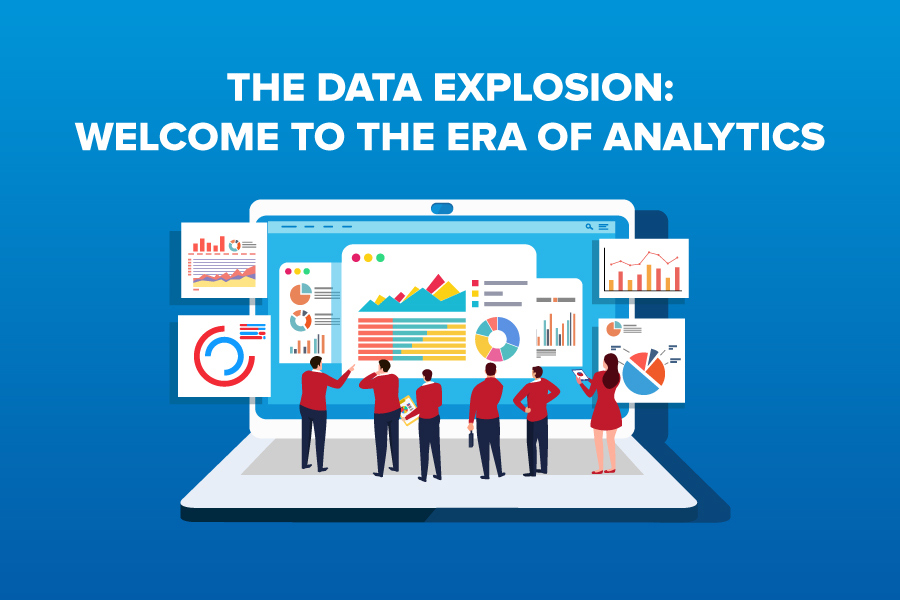When a star dies it creates an explosion, a Big Bang, in space. Matter from the star is spread across the galaxy forming a Nebula. Over time the matter accumulates to form a new star. So what do stars, nebulas and galaxies have to do with IT?
It’s a perfect analogy for what has happened with data collection. The increase in internet accessibility and use has led to a Big Bang of data. According to experts, 90% of the world’s data has been generated in the last 2-4 years.
In June this year, there were a reported 4.4 billion internet users worldwide. This obviously contributes to the data explosion. But data is also being collected in everything we do even when we don’t see it – at the grocery store, on the bus, at the movies. Somewhere our actions and choices are being recorded, refined, distributed and monetised.
The era of analytics
With this glut of data, new analytics and Business Insight (BI) software have been developed to enable businesses to access previously unavailable data. Ten years ago, BI projects garnered little attention and investment compared to other enterprise systems like CRMs.
However, that has all changed. Now we live in an era where data is readily available and accessible. BI and Data Analytics are now potential game-changers for organisations. Thanks to data scientists, engineers and analysts each piece of data that is generated today gets processed and inputted to a decision support system.
BI has now grown into an industry of its own. Data Warehouses, Datamarts and Data Vaults are no longer a thing of science fiction. An ever-increasing number of organisations have implemented, and benefited from, Data Analytics.
This surge in BI use and popularity is in a large part due to the mass migration to the Cloud.
Is the data explosion a good thing?
The short answer is yes. The new level and depth of data allows businesses to make decisions based on evidence, not gut instinct.
However, some businesses that have not evolved their infrastructure to keep up with the data revolution, may question the accuracy and currency of data. This can be problematic as in order to make decisions on data you first need to know the data is valid.
Before letting data drive your business you need to ensure that the data sources are correctly integrated and that your existing IT infrastructure can work in the way you need it to.
Three key considerations when accessing your data
When accessing your data there are some key points to consider before rolling out BI in your business.
1. Becoming a data-driven business takes time
Change doesn’t happen overnight. Transforming to a data-driven business takes time, you are essentially overhauling all your decision-making processes. Don’t expect accurate results overnight. As with all major implementations, you need to allow for a proportionate amount of time to build, test and roll out the BI and Data Analytics.
2. The unavailability of adequate skills
It’s important to acknowledge that your existing staff may not have the necessary skills to seamlessly transition to BI processes. It isn’t reasonable to expect your staff, subject matter experts in their own fields, to become experts in the data field. To improve transformation success and adoption, consider consulting with specialised external experts like WARDY IT Solutions.
3. Quality Assurance (QA)
For no apparent reason, businesses seem to forget about testing and QA in BI. In fact, many BI projects don’t have testers allocated to them. But there is no reason why modern QA tools can’t be leveraged to cater to BI. Reporting is always essential but especially so when resources are low.
What’s next?
With data being created at such a rapid rate, it is no surprise that data analysing technology has taken some time to catch up. However, with modern IT capabilities and Power BI being accessed through an increasing number of Cloud migrations this is no longer an issue.
With the rapid improvement in data supportive technology, businesses are progressively able to trust their data, paving the way for Artificial Intelligence and Machine Learning’s generation of acceptance.
How can your business benefit from Data Analytics?
If you are currently unsure if your data is trustworthy or would like to learn more about the benefits of Power BI, contact the team at WARDY IT Solutions.
WARDY IT Solutions are Australian leaders in the field of IT and data analytics. We offer a range of services and training to help businesses transform into data-driven businesses.
Learn more about Data Analytics
